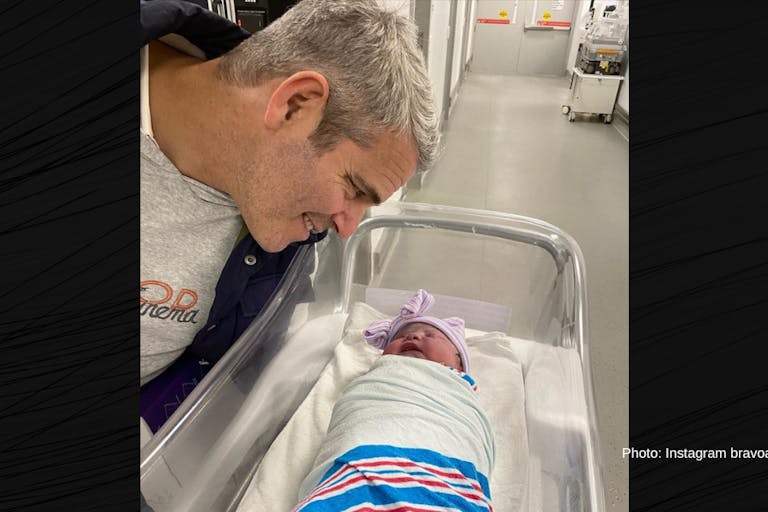
Surrogacy business owner sentenced to two years for scamming clients
Nancy Flanders
·
Andy Cohen shares ‘weird thought’ of his born children someday birthing his other embryos
Bravo star Andy Cohen appeared on an episode of Sirius XM’s “Jeff Lewis Live” on June 6, during which he spoke about his two born children, including the idea that, as reported by People, “he would let [his born children] use his remaining embryos” when they want to start families as adults.
Cohen has two children born via an embryo “donor” and two different surrogates: Benjamin, age three, and Lucy, who is just over a month old. But he also has children who are still currently frozen at the embryonic stage of development — except he can’t remember how many of them there are.
When asked how many embryos he has frozen, he replied, “a couple.” He continued, “I have a few. I can’t remember. I think I have three left?” He went on to say, “You know what I’m thinking — this is crazy — but if either of them cannot have kids, maybe in 20 years they’ll defrost their sibling and raise them. Is that a weird thought?”
It is a weird thought — but more importantly, it’s a human rights concern. Perhaps Cohen is feeling a bit of guilt over leaving his children frozen, but he speaks about them as if they are products he can keep frozen until perhaps his other children want them. He easily uses the phrase, “defrost their sibling” as if it’s normal to freeze human beings until an adult decides they want to let them continue on with their lives — until an adult decides to label the children “wanted.” These embryos are living human children who have been created, frozen, and may someday have the chance to be defrosted on the whim of an adult to fit adult desires.
READ: Buying a baby: The harmful objectification inherent in surrogacy and IVF
In addition, Cohen told the TODAY Show in 2019 that he chose surrogacy over adoption because “I was fortunate to have the means to be able to — it can be expensive and complicated. And I just said I’m going to do this. I’m going to try to do this.” He said he doesn’t understand why surrogacy is illegal in some states, but his own statement explains why. Surrogacy involves wealthy, privileged people paying poor or underprivileged women for the use of their bodies. It’s the exploitation of both women and children.
There are thousands of children available to adopt in the United States through the foster care system. However, most of those children tend to be older. There is a waitlist to adopt newborns in the U.S., which, in addition to the desire for a biological connection, fuels many people to choose surrogacy — if they can afford it.
However, it’s that very desire for a biological connection to a child that these same parents are denying the children they create.
Children conceived through egg “donation” and surrogacy as well as sperm “donation” are deprived of knowing and being loved by at least one of their biological parents, and this frequently leaves a lasting hole in their lives. This is why closed adoptions are becoming a thing of the past. We have learned that children need to know where they come from and have a right to know their biological parents.
According to a Harvard University study, 62% of children conceived through donor technologies, including surrogacy, believe these technologies to be unethical and immoral. One woman told the pro-children’s-rights organization Them Before Us, “Somehow, somewhere, my parents developed the idea that they deserved to have a baby, and it didn’t matter how much it cost, how many times it took, or how many died in the process. They deserved a child. And with an attitude like that, by the time I was born they thought they deserved to have the perfect child… as Dad defined a perfect child. And since they deserved a child, I was their property to be controlled, not a person or a gift to be treasured.”
“Like” Live Action News on Facebook for more pro-life news and commentary!
Live Action News is pro-life news and commentary from a pro-life perspective.
Contact editor@liveaction.org for questions, corrections, or if you are seeking permission to reprint any Live Action News content.
Guest Articles: To submit a guest article to Live Action News, email editor@liveaction.org with an attached Word document of 800-1000 words. Please also attach any photos relevant to your submission if applicable. If your submission is accepted for publication, you will be notified within three weeks. Guest articles are not compensated (see our Open License Agreement). Thank you for your interest in Live Action News!

Nancy Flanders
·
Activism
Cassy Cooke
·
Politics
Bridget Sielicki
·
Issues
Nancy Flanders
·
Issues
Bridget Sielicki
·
Issues
Angeline Tan
·
Politics
Nancy Flanders
·
Politics
Nancy Flanders
·
Abortion Pill
Nancy Flanders
·
Politics
Nancy Flanders
·
Human Interest
Nancy Flanders
·